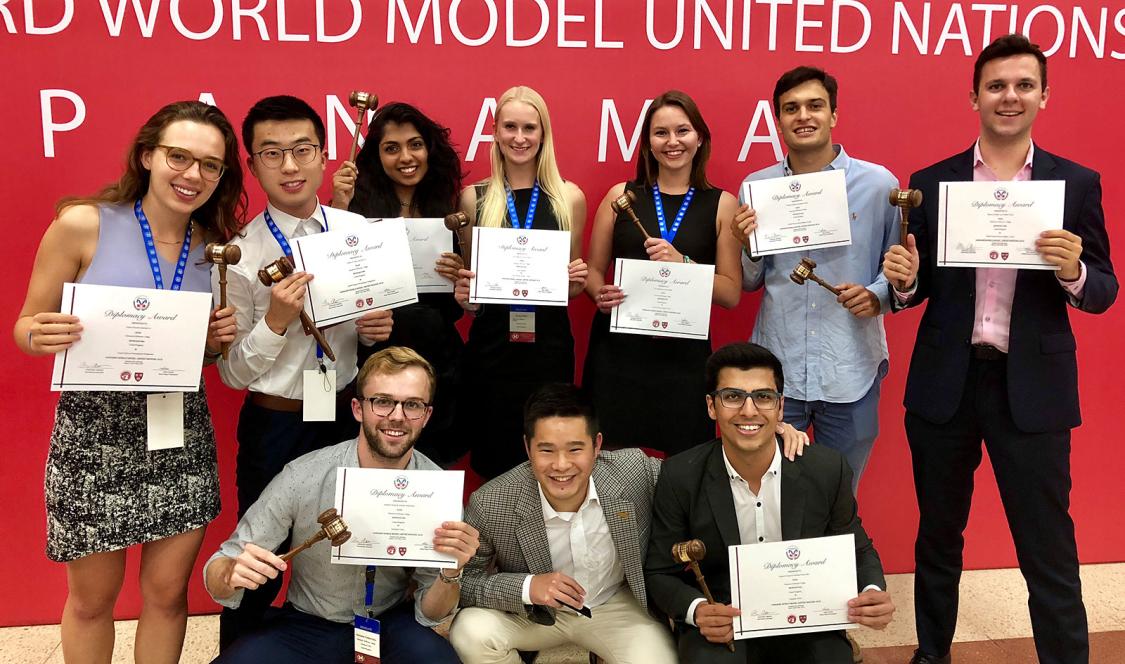CMC’s Model UN delegates are world champions – again. This spring break, the team of 10 beat out Georgetown University to claim the title of Best Small Delegation at the 27th annual Harvard World Model United Nations Conference in Panama City, Panama.
“When we walked out of the closing ceremony,” Jerry Li ’18 said, “I felt an immense sense of pride for everything we managed to accomplish, as well as a sense of comforting closure for my CMC experience.”
In addition to the team’s win, each delegate was also commended individually, with nine diplomacy awards – the highest award at the competition – and one verbal recognition.
The team was made up of three seniors, five juniors, and two sophomores. Samarth Chawla ’19 and Jerry Li ’18 served as head delegates, with Kate Ridenour ’18, Thomas Schalke ’18, Emma Houston ’19, Nick Fedorochko ’19, Payson Ruhl ’19, Zach Wong ’19, Shreya Bhatnagar ’20, and Andrew Ciacci ’20 rounding out the team.
WorldMUN is one of the largest international Model UN competitions in the world. Considered the “Olympics of Model UN,” it draws the top competitors from colleges and universities across the world. This year, the CMC students were among more than 2,000 participants from more than 80 countries.
The competition was palpably intense, Li said. “The Belgians, Peruvians, and Venezuelans are known for being fantastic delegates, and we all knew they would be stiff competition,” he said. But, with previous wins under its belt, “CMC has built a fantastic reputation for itself on the international circuit.”
Model United Nations is run as an authentic simulation of the actual United Nations body. Participants have an opportunity to hone their public speaking, writing, and collaboration skills. They research and argue real-world issues, taking the concepts and theories learned in the classroom into simulated UN committees.
Paired with delegates from countries from Australia to Venezuela, the CMC team tackled such timely issues as cyber security, preserving the European Union after Brexit, resolving the Rohingya refugee crisis in Asia, and addressing gender discrimination through an economic lens.
Preparation for a competition like this, the students said, involves hours of mock debates and research including synthesizing articles, reviewing footage of actual debates on these issues, and tapping professors’ expertise on campus.
“Whether it’s in a classroom at CMC, in a boardroom at work, or in tough social situations,” Li said, “I have been able to display the skills I gained in Model UN through performing solid presentations, negotiating with tact and empathy, and bringing varying interests together to achieve compromises.”
Although CMC has been participating in Model UN since 2004, the program is relatively new to ranking among top-tier Model UN teams, with many of the major competitors having historically-strong teams.
The team is now able to elevate its competitiveness by traveling to more competitions, thanks to a recent $250,000 gift from donor Eric X. Li.
And CMC has been on a roll this year. Earlier this spring, the team won both individual and group awards at its first two conferences of the semester at Harvard University and Pomona College.
Veteran MUN delegate Chawla attributes their winning season to a couple of things: “I think it just comes down to a) hard work … and b) team dynamic.”
This year marks the fourth world championship win for CMC, with previous victories in Vancouver (2012), Seoul (2015), and Rome (2016). Next up for team CMC is LAMUN, UCLA’s annual collegiate MUN conference, from April 19-22, which they also won last year.
– Michelle Maltais

